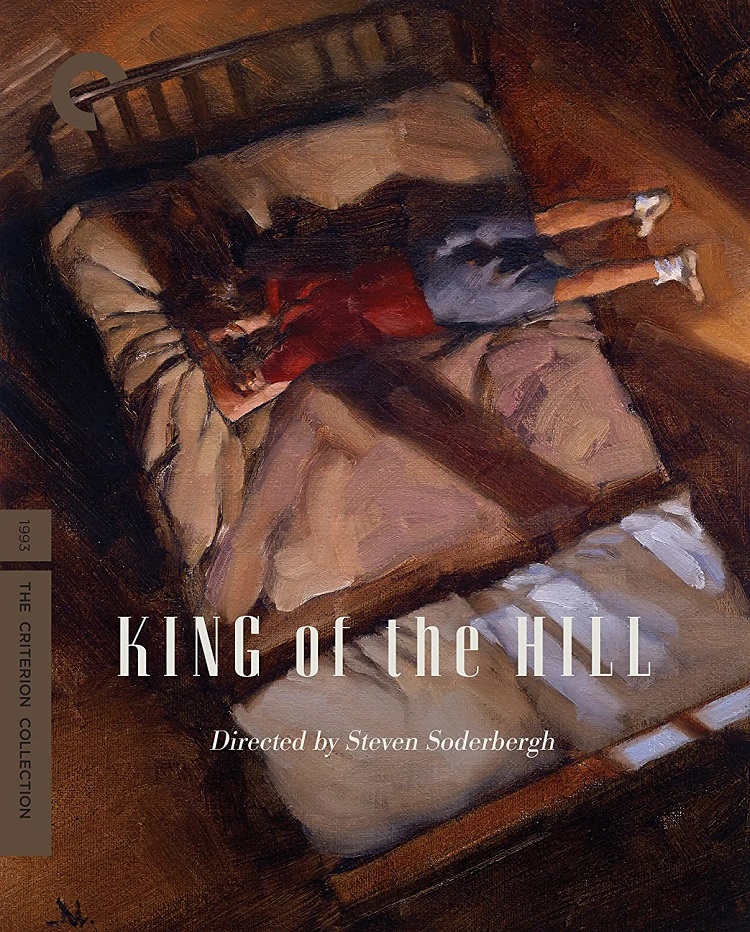
For those who insist on dividing Steven Soderbergh’s filmography into the reductive “one for me” and “one for them” categories, King of the Hill likely represents Soderbergh’s first foray into mainstream filmmaking. Superficially, they’re right — it was his first studio film and its coming-of-age tale set in Depression-era St. Louis is certainly more accessible than Sex, Lies, and Videotape or Kafka. But — as is generally the case when it comes to Soderbergh — there’s a lot more than first meets the eye to King of the Hill.
Sure, there’s some burnished sentimentality in the film; Soderbergh himself admits as much in the supplements on the superb new Criterion dual-format edition — amazingly, the first U.S. DVD or Blu-ray release of the film ever. But, I’m keener on this than the filmmaker, who seems a little suspicious of the warmness that made it onscreen. The mood is hardly one-note mawkishness; moments that warm the heart are balanced by a palpable sense of interior anxiety in main character Aaron, and Soderbergh’s structural playfulness and ruthless editing abilities had already developed into something formally formidable.
The film also highlights two skills that Soderbergh doesn’t get nearly enough credit for — writing and directing actors. He would give up writing his own scripts shortly after King of the Hill, but it’s hard to imagine a much better adaptation of the source material, a memoir by A.E. Hotchner. And one has to chalk up some of 14-year-old Jesse Bradford’s knowing but vulnerable performance as Aaron to Soderbergh. Bradford’s charm is just natural talent, but has he given a single memorable performance since?
Bradford’s Aaron is a kid living in a hotel room with his parents (Jeroen Krabbé and Lisa Eichhorn) and little brother, Sullivan (Cameron Boyd). They’re barely scraping by, so Sullivan gets sent to some relatives, separating Aaron from his closest friend. Soon, his mother must be hospitalized due to tuberculosis, and shortly after, his father takes a job selling watches on the road, leaving Aaron completely alone.
Aaron is also isolated by class; surrounded by peers in a different social stratum, he puts up various fronts to his classmates and teacher (Karen Allen). In the misfit world of the hotel, he is more able to be himself, making friends with the roguish Lester (Adrien Brody), the eccentric across the hall, Mr. Mungo (Spalding Gray) and the sickly girl who adores him, Ella (Amber Benson). Ultimately, Aaron must learn to rely on himself, but Soderbergh never puts too fine a point on this, allowing the character growth to feel much more natural than other similar stories.
King of the Hill feels a little like an outlier among Soderbergh’s filmography, but it’s hardly an atypical film. It’s an affectionate, inclusive film made by a smart filmmaker — Soderbergh’s done far more radical, interesting things since, but that doesn’t make this feat any less rare.
The Blu-ray disc included in the set presents the film in 1080p high definition and a 2.35:1 aspect ratio. The film’s golden hues look exceptional — warm and rich without ever becoming oversaturated or oppressive. Detail levels and clarity are excellent throughout, and a subtle grain structure gives the transfer a nice film-like appearance. The 5.1 DTS-HD Master Audio soundtrack is subtle, but clean and effective, reserving the surrounds mostly for the score.
Criterion’s line-up of extras is very impressive. The big one is the inclusion of The Underneath, Soderbergh’s next film after King of the Hill. The Underneath had only received a crappy non-anamorphic DVD release in the U.S. before now, and this 1080p, 2.35:1 transfer is a massive improvement. There’s only lossy audio and the transfer isn’t quite as sharp as it could be, but it still looks pretty good.
An accompanying interview with Soderbergh features his honest, very dismissive thoughts about The Underneath, but both the manipulated color and non-linear structure of the film are appealing, and even though Soderbergh blasts the slow pacing, I kind of enjoy the deliberateness of it all. The noirish script gets pretty stupid at points (not the last time Soderbergh would elevate a bad script), but the filmmaking is a lot better than Soderbergh gives himself credit for.
Another Soderbergh interview features his thoughts about King of the Hill, which aren’t as dismissive, though he expresses some reservations. Soderbergh is a fascinating, incisive, brutally honest interviewee, willing to self-examine without pity. An interview with 93-year-old memoir writer Hotchner is also included.
A video essay by filmmaker ::kogonada examines the seeds of Soderbergh’s convention-busting narrative tactics in King of the Hill, while six deleted scenes flesh out a few more character details. The disc also features trailers for both films. The set includes a booklet with an essay by critic Peter Tonguette, a 1993 interview with Soderbergh and an excerpt from Hotchner’s memoir.